To the uninitiated, the Greater Coucal looks like some sort of large red-eyed corvid. This resemblance is so strong, in fact, that Coucals are often referred to as “crow-pheasants.” With coppery brown wings, a sleek black body, a long tail, and a curved bill which almost resembles that of a bird of prey, the Coucal is a bird whose true nature is hard to see. Despite supposedly looking like a corvid, a pheasant, or a hawk, the Coucal is, in fact, a species of cuckoo. Unlike some other cuckoos, the Coucal is not a nest parasite and is instead connected with a variety of positive meanings and omens within the regions of India and Southeast Asia where they are found. Coucals are also found in Africa, Madagascar, and Australia. (1)(2)
There are actually thirty species of Coucal, but the Greater Coucal is the most recognizable and is featured much more prominently in folklore and superstitions, so much of our discussion will focus on this specific bird. Continue reading to learn all about the myths, omens, and superstitions which are connected with the Coucal!
Coucal Symbolism and Meaning
Firstly, the Coucal is connected with mistaken identity. This is evidenced by the fact that whilst being neither crow nor pheasant, the Coucal is colloquially named for both. This “crow-pheasant” supposedly resembled a pheasant to British newcomers to India to such a degree that they often mistakenly shot Coucals and were disappointed to find that they had not caught a game bird. According to contemporary accounts of these events, the Coucal’s meat has an “evil flavor” and is not fit to be eaten. (3)
In general, Coucals are thought to signify good luck. Hearing the Coucal’s distinctive call is thought to indicate that spirits are nearby. (4)
On a number of very limited occasions, Coucals have been reported to exhibit a very unusual behavior. According to the select few researchers who have witnessed this, some species of Coucal will actually carry their young as they fly. The parent bird is said to have been observed grasping the young bird by the shoulders and taking to the sky with it. This behavior is not common amongst birds in general nor has it been widely reported or described amongst Coucals. Regardless, the Coucal may be connected with parenthood, passage, or burdens. (5)
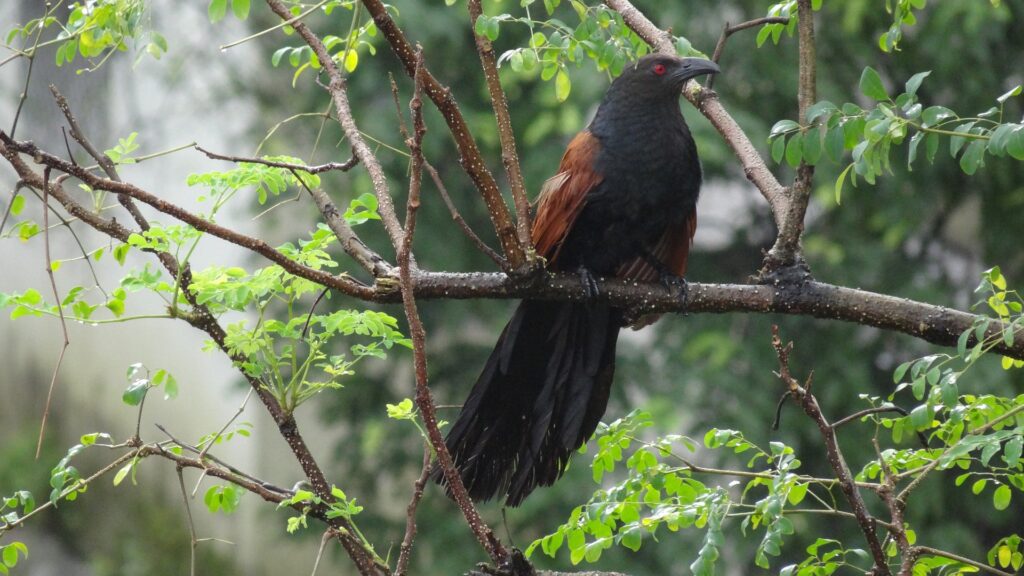
One common superstition surrounding Coucals involves their healing or medicinal properties. It is said that Coucals possess an incredible and deep knowledge of medicine and healing. When a Coucal’s chicks are wounded, traditional superstitions state that their mother will find special grasses which can heal any ailment and feed these to her young. To benefit from this, one superstitious practice involved breaking the legs of Coucal nestlings and then waiting for the mother to return and heal them. After the chicks were supposedly healed, it was believed that their bodies were rich with medicinal herbs and could be eaten or turned into an oil to heal ailments like broken legs. While this does associate the Coucal with healing and herbal knowledge, it also connects these birds with the cruelty of such practices. (6)
While the flesh of the Coucal is said to be foul in flavor, that hasn’t stopped it from being historically used as “cure” for tuberculosis. (7)
Greater Coucals are monogamous and much of the nest-building process is carried out by the male of the species. Coucals have a fairly high success rate for their nests which can be attributed to the care that they take in raising their young within thick brambles. Some Coucal species seem to exhibit a behavior which is well-known amongst Hoopoes. This defense mechanism involves nestlings, when disturbed, hissing like snakes and spraying intruders with foul-smelling excrement. This behavior connects the Coucal with home defense, protection, and courage. (8)
Coucal Native American Symbolism
Coucals themselves are not found in the Americas, but cuckoos are common and the Coucal is a member of the cuckoo family. For the Iroquois, the cuckoo is associated with laziness. This is because the Iroquois observed that certain species of cuckoo are brood parasites which lay their eggs in the nests of other birds and do not rear their young themselves. The Coucal is not a brood parasite, however, so it is difficult to say what meanings it might’ve held for Native American peoples. (9)
Coucal Christianity Symbolism
Leviticus features a long list of animals which are unclean and mankind is instructed by God to avoid eating. This list features quite a few birds. While the Coucal is not listed, its supposedly “evil-tasting” meat might associate it with this Old Testament mandate. (10)
Coucal Celtic Symbolism
Cuckoos in Celtic traditions are connected with death and with the passage between the earth and the supernatural Otherworld. The calling of the cuckoo was said to signify an imminent death. Cuckoos have even been thought of as being capable of predicting the length of one’s life. (11)
Coucal in Dreams
Dreaming of a Coucal is connected with good luck above all else. Coucals are widely regarded as positive symbols which bring good fortune and success wherever they go. Dreaming of a Coucal might indicate that you will soon catch a lucky break or be on the receiving end of an unexpected fortune.
A Coucal dream might also represent one’s family. Unlike many other cuckoos, Coucals are not brood parasites and they devote much energy to their young. Dreaming of a Coucal carrying its child might indicate cooperation or support. It is important to maintain family relationships so that you can rely on them in difficult times.
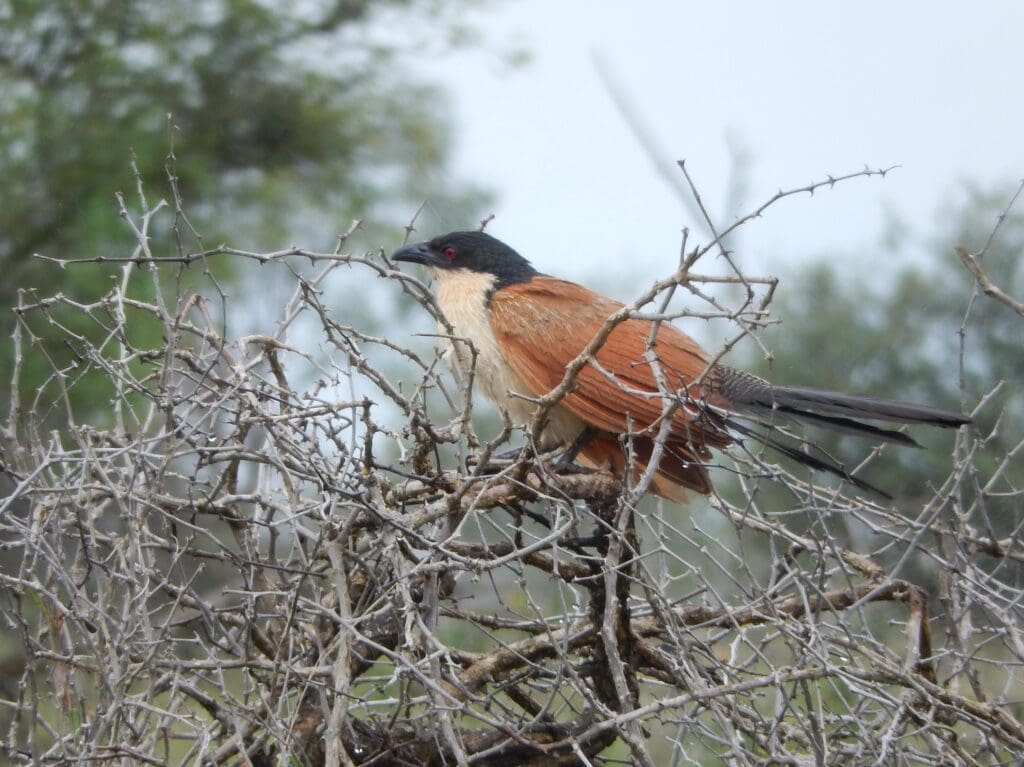
A Coucal dream may also indicate misjudgment. For the hunter who mistakes the Coucal for a pheasant, what awaits is an inedible meal. Hunting a Coucal is wasteful and does not benefit the hunter. Make sure that the efforts that you make in your life are sure to benefit you.
Coucal Encounters and Omens
Encountering a Coucal is, again, a very positive sign according to most traditions. Coucal encounters are said to lead to good luck and great fortune. Riches and health are said to follow the Coucal.
An encounter with a Coucal might relate to healing. If one is injured or distressed when a Coucal visits, then this might mean that whatever ails you will soon be healed. The Coucal is said to hold secret knowledge of herbs and remedies. A Coucal encounter may bring a sense of renewal and recovery with it.
Encountering a Coucal nest refers to hidden things. Coucal nests are well hidden and are defended by the young which inhabit them. Such a Coucal encounter acts as a reminder to show respect for others’ secrets and to be gentle and kind towards vulnerable things.
Coucal in Mythology & Folklore
Coucal folklore is largely connected with various forms of traditional medicine. Finding sources on this lore in English is difficult, but below are a few tidbits which I’ve managed to put together about this fascinating bird.
Hindu Mythology:
Common folklore seems to suggest that the Greater Coucal is one of the reincarnations of the Hindu god Vishnu. Vishnu is a benevolent and divine being who appears in many forms. I cannot locate a definitive source for his connection with the Coucal, however I have seen a number of references to this fact, including some which claim that in parts of India it is customary to bow to the Greater Coucal when one crosses paths with this bird. I am unsure of how true this is, but I found it interesting enough to include here. (12)
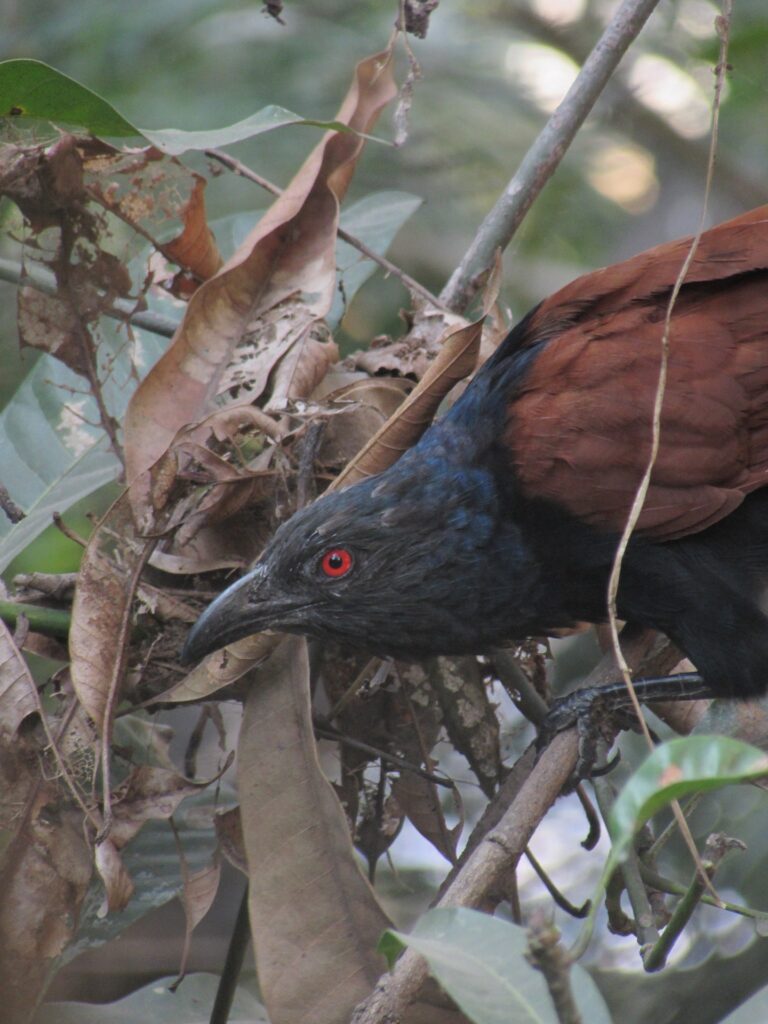
A myth from southern India suggests that the incredible power of the Coucal can be exploited for great personal gain. According to a legend recorded in a 1906 manuscript by a British man in southern India, a Coucal can be a source of gold for someone with the appropriate knowledge and ability. It is said that if a Coucal chick is captured and chained up via an iron chain, its mother will come find it and use a special herb to snap the iron chain. As soon as this secret Coucal herb touches the chain, it sill snap. The snapped chain will instantly transform from iron into gold. (13)
Further myths and superstitions surrounding the Coucal suggest that this bird utilizes a special medicinal grass with miraculous properties when building its nest. This special grass is said to be completely indistinguishable from other grasses, so a human could never find or identify it. The only way to obtain this grass is to take a Coucal’s nest and cast it into a river. According to legend, the special grass of the Coucal will disentangle itself from the other grasses in order to flow backwards against the water’s current. This is said to be the only way in which this grass can be found and identified.
African Mythology:
According to one African folktale, King Sumanguru, who was a medieval king of the Sosso people which inhabited modern day Mali. According to legend, Sumanguru could transform into a Senegalese Coucal. (14)
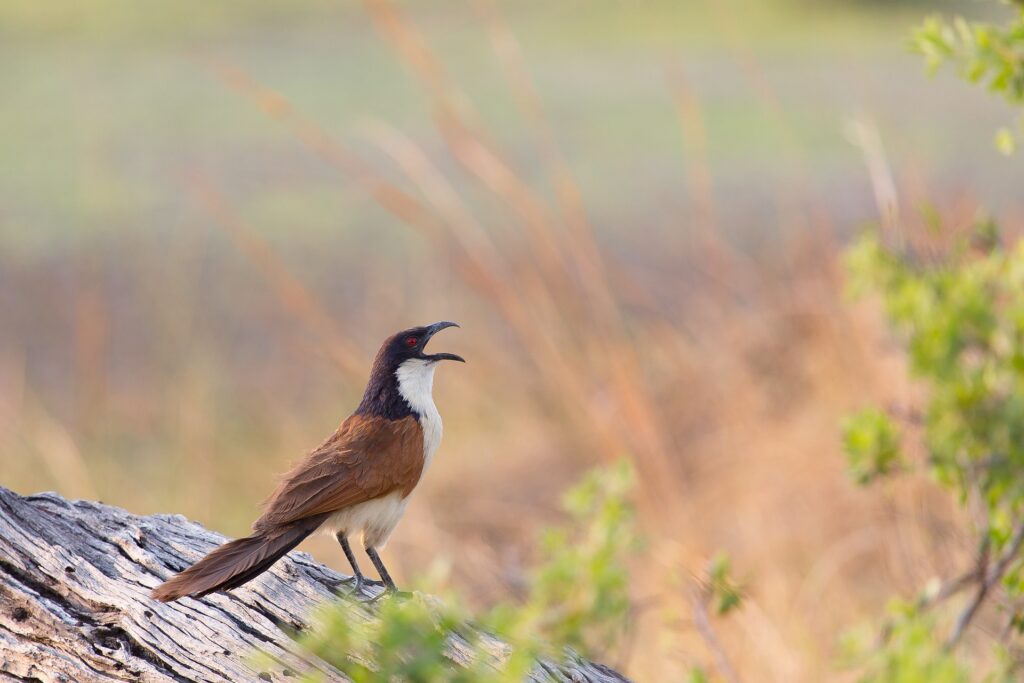
Additionally, the Burchell’s Coucal is sometimes referred to as the “rainbird” in parts of Africa because of a belief that these birds call most often when rain is coming. The South African poet, Douglas Livingstone wrote this on the “rainbird”:
“One day you turned to me and said “Goodbye”,
“We’re all washed up,” and “Better we should part.”
Then as my spirit jerked and bobbed afloat
I drowned in unreality to lie
Upon a muddy world that leaned awry
With Bubbles, weed, old boots and fishy dart.
Then from this depth I stood, absurd, remote,
And drifted out.
Beneath a filmy sky
I paused to listen to my flustered heart
And heard instead the rainbird’s liquid note.
I surfaced, walking with a firmer tread
And joined the rainbird in his mournful art,
but as the cricket in his plastic coat,
I gaily chirruped how my love was dead.”“The Rainbird” by Douglas Livingstone (15)
Coucal Spirit Animal
If your spirit animal is the Coucal then you are likely secretive, empathetic, and careful. People with the Coucal spirit animal tend to be very protective of their loved ones and are most comfortable when they feel that the things which matter to them are properly guarded and protected.
The Coucal spirit animal may be found in introverted people, but this animal is certainly not shy. People with this spirit animal like to focus on a few important relationships, however they enjoy expressing themselves and do not hold back from sharing their true thoughts.
The Coucal spirit animal is a nurturer and loves to care for things. People with this spirit animal tend to be especially drawn to gardening and cooking as hobbies, because these hobbies allow them to tend to others. The Coucal spirit animal is curious, intelligent, and loves to learn new things.
Coucal Totem Animal
The Coucal totem animal is connected with secret knowledge. People with this totem animal tend to insightful, reserved, and shrewd. The Coucal totem animal enjoys studying and collecting useful information. This totem animal can be trusted with secrets, as it never shares them or gives them up.
People with the Coucal totem animal tend to try new things often and enjoy a range of hobbies. This helps satisfy their thirst for knowledge.
Coucal Power Animal
The Coucal power animal is associated with growth and healing. It is said that the Coucal has the power to heal any ailment. People with this power animal have a miraculous touch which rejuvenates all who experience it. People with this power animal will likely be drawn to healing careers.
Coucal Tattoo Meaning
A Coucal tattoo might be chosen to represent good fortune, healing, medicine, or sacred knowledge. For an individual of the Hindu faith, a Coucal tattoo may be tied to Vishnu.
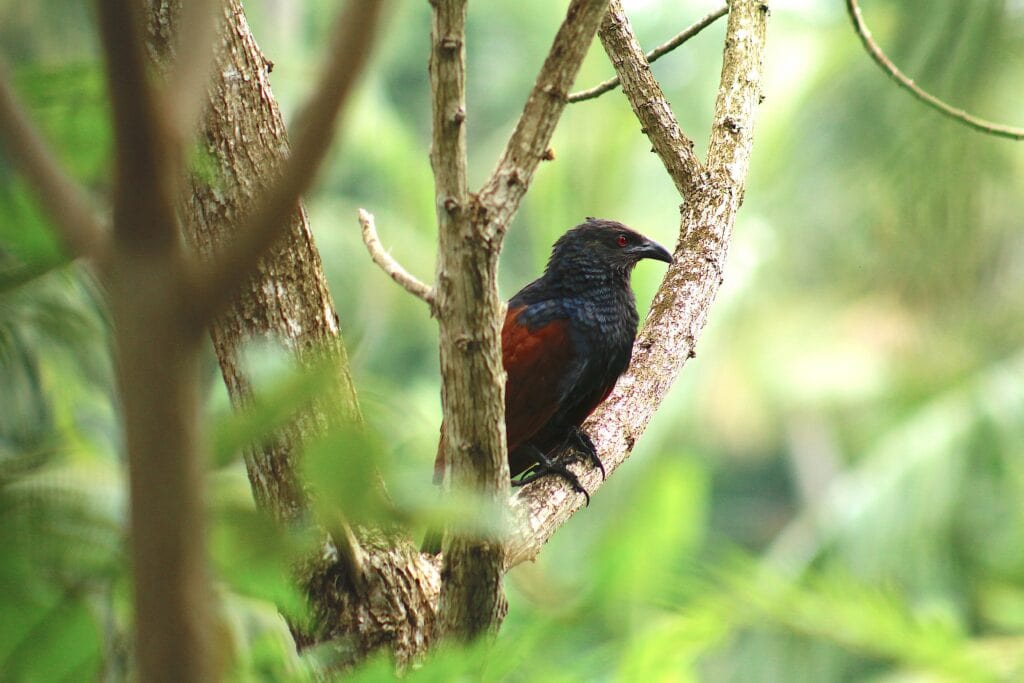
The Coucal as a tattoo subject might also be tied with tradition, guidance, and insight.
Conclusion
The Coucal’s unique and unusual appearance is second only to the rich and eccentric collection of myths and beliefs that have sprung up around this stunning bird. With piercing eyes and striking colors, the Coucal is a bird which seems to hold knowledge beyond human understanding. Perhaps this is why so many believe that this incredible animal holds the secret to healing remedies and even alchemy!
